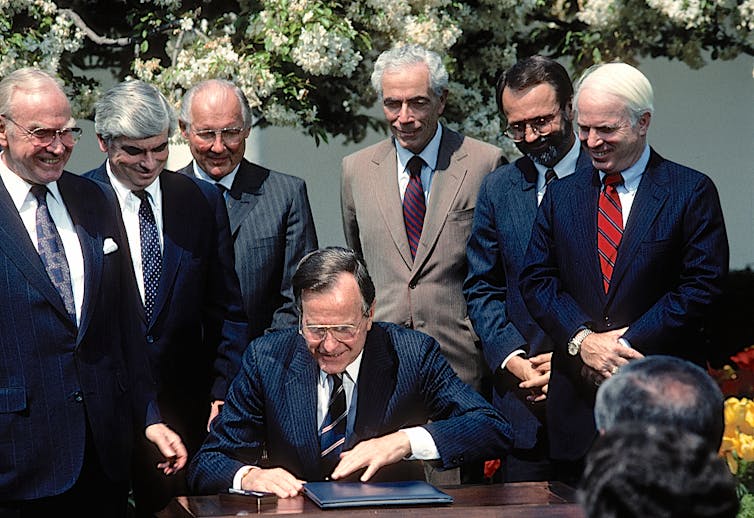The sharp increase in political polarization in America over the past 50 years has been driven in part by how different generations think about politics. But the rise of younger generations to political power may actually erase the deep social divisions associated with polarization.
That’s one of the strong possibilities for the future suggested by the diverse array of findings of our research, including editing a collection of the most current work on how different generations of Americans participate in public life.
For the past 30 years, baby boomers (those born roughly between 1946 and 1964) and members of the Silent Generation (those born between 1925 and 1945) have driven and defined American politics. For the most part, the Silent Generation and the older baby boomers were the core of the Republican Party. And the younger baby boomers, along with many Gen Xers (born roughly between 1965 and 1981), formed the core of the Democratic Party.
Millennials (born between 1982 and 1995) and Gen Z (born between 1996 and 2013) lean liberal and are more likely to vote for Democrats. They were key contributors to Democratic election wins in 2018, 2020 and 2022, especially in swing states.
Based on our research, presented in “Generational Politics in the United States: From the Silents to Gen Z and Beyond,” earlier generations – the Silents, baby boomers and Gen X – are more divided than millennials and Gen Z.
We expect that in the future, highly partisan members of the Silent, boomer and Gen X generations will exit and no longer be part of American political life. They will be replaced by millennials and Gen Zers, who are less likely to define themselves as strong Republicans or Democrats. The greater consensus among young people today may lessen polarization.

5 decades of change
Back in the 1960s and 1970s, the vast majority of Americans had views roughly in the political center, with smaller numbers of people holding notably right-leaning or left-leaning opinions. In general, most voters had a broad consensus on policy issues. The Democratic and Republican parties were also broadly centrist. During this time period, Congress passed the Great Society programs, the Omnibus Crime Control and Safe Streets Act and the Clean Air Act with bipartisan support.
But over the past 50 years, fewer and fewer Americans have identified themselves as aligned with the political center, and more have described themselves as on the right or the left, either as liberals or conservatives. This has led to increasing differences between the political parties, with the Democrats to the left of center and the Republicans to the right.
Members of Congress now are more likely to stick with their political party when voting, rather than vote for legislation supported by the other party. Recent passage of legislation linking Ukraine aid with support of Israel has been described as “rare cooperation among the parties.”
This polarization has many causes, including the influence of special-interest money on lawmakers and parties and society’s increased economic inequality. But our research highlights the role that new and changing generations can play in future shifts in American politics.
American politics is the constant cycle of generations entering and exiting the political arena. Even more, variation in the social and political environment during each generation’s formative years notably affects the attitudes and behaviors each generation will subsequently adopt.
For instance, the youngest generation is used to a 24-hour online news cycle and has experience with contested elections. Changes in generational attitudes today hold the potential to lessen current levels of polarization.
Generations have different characteristics
When we look across the past century, our research finds profound differences in the demographics and political views of the generations today.
The millennials and Gen Zers are the most racially and demographically diverse generations in American history. They are the least religious, which means they are less likely than their elders to say they follow a religion, to believe in a biblical god and to pray.
Additionally, these younger generations are more likely to self-identify as liberal. As we and others explain in several chapters of our book, surveys show they are more liberal on a whole range of issues regarding social matters, the economy, immigration and climate change.
Millennials and Gen Zers also vote more Democratic than older generations. And there is some evidence to support the expectation that their governing style as elected officials emphasizes issues that millennial citizens care about. For example, a set of millennial mayors who held office at various times from 2004 to 2024 focused on traditional economic concerns but also added social justice perspectives to the mix.

A new political center?
The consensus on political views among members of these younger generations means there is potential for decreasing polarization. This would be a key change in American politics, we believe for the better.
But there are other possible scenarios. As the old saying goes, demographics are not always destiny. There are thorny methodological questions involved in pinning down the impact of generations.
Politically, young Republican men can be conservative on social issues. And consensus among young Democrats could be challenged by events such as campus protests over the Israel-Hamas war in Gaza.
Overall, however, generational shifts portend the possibility of decreasing polarization.

The authors do not work for, consult, own shares in or receive funding from any company or organization that would benefit from this article, and have disclosed no relevant affiliations beyond their academic appointment.
Source: The Conversation




